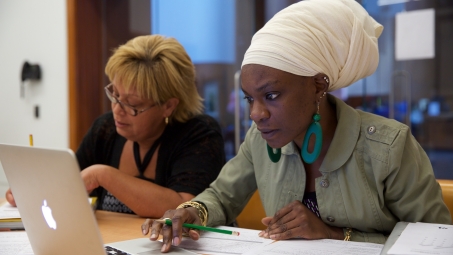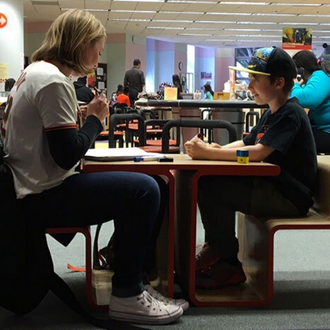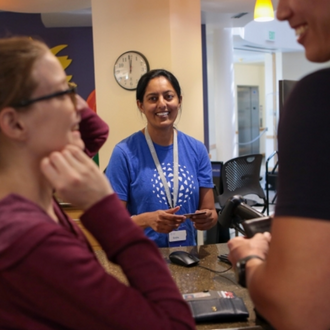Revisiting 2018 Top Innovators: Teacher Lab
Q&A with Brooklyn Public Library's Outreach Librarian Amy Mikel

The Teacher Lab online course, launched in July 2017, is Brooklyn Public Library’s effort to connect library resources with as many teachers as possible. The free, self-paced course introduces fundamental library, research and information literacy skills while helping K-12 educators find a richer variety of resources for their classrooms. The success of this program earned BPL a Top Innovator award in the Education: Adults — category of the 2018 ULC Innovations Initiative. ULC connected with BPL Outreach Librarian Amy Mikel to follow up and learn more about how this program has evolved since its Top Innovator win. Read her responses below.
As of now, how many educators have enrolled in Teacher Lab? How many have earned their 12 hours of state certified credit?
To date we have 1,890 enrollees in the course. We haven't done any national publicity lately so most of the enrollees come from the New York State region via word of mouth. Nearly 300 enrollees have completed all coursework and graduated, earning 12 hours of CTLE professional development credit.
Do you have any anecdotes or data that tell you that more teachers are now using the library as a resource because of the Teacher Lab program?
I grade coursework by reviewing required discussion board posts and "Exit Tickets" (posts about what they learned) for each of the 12 course modules. So I constantly see evidence about what teachers are learning about the library! I frequently hear comments to the effect of, "I didn't know the library did that." One of my favorite comments has been, "Why has no one ever taught me this before?" In an early module, educators are required to visit their local library and complete a few tasks in the building, and I see many post about how they haven't visited their library in years, and are surprised by how friendly and welcoming the space is versus what they remember.
Same goes for the very next module when we introduce the library catalog and how to find and order materials to your local branch. This generally is not common knowledge to many teachers (and the general public), so it's a pleasure to watch them discover how easy it is to use the library in this way.
Many educators express surprise (even shock) in learning about curated information resources like databases and archives. This is usually not formally taught to them so they have relied on Google to find what they need. I see evidence in the comments that educators will be incorporating these resources more into their classroom, but I have no hard data to support that.
In summary, I can't recall a single educator who hasn't expressed that they learned many new things about the library — even those who thought they knew it all already! I think many educators start the course because it's an opportunity to earn some free PD credit but I am very confident they leave the course with a new energy about the library as a resource.
How has the course evolved since it launched in 2017?
The heavy lift was getting the course up and running but I haven’t needed to make any significant changes to the syllabus. The material is evergreen — how to use your local library and its resources, introducing archives, using online tools like Google and Wikipedia, fundamentals of research and info literacy — and generalized enough so that it’s applicable regardless of location (NYC versus upstate New York versus out-of-state educators). The final assignment is hyper-applicable to each student as they must build a resource list on any topic of their choice.
In other words, the course was designed to run continuously without many adjustments or much upkeep and I’m happy to say that’s exactly how it’s playing out.
I’ve made some small changes since I launched, like adding a small lesson to clarify some material (I realized I needed to spend some more time explaining citations). Overall I keep the content “pruned,” meaning I upload new documents if due dates or similar small pieces of information need changing, and I sometimes substitute new readings in. (For example, I just posted this link as extension reading in one of the modules.) I also selectively re-record some of the courses to ensure the information is current. For example:
- My guest instructor from Teacher’s College @ Columbia University just republished her three lectures on using the Digital Public Library of America. The DPLA interface has changed in the past two years and we wanted her demos to match the new tool; we addressed some of the most frequently questions about DPLA published on the discussion boards, and demoed a few DPLA tools that are new or improved since 2017.
- I’m working on redoing both the Google and Wikipedia lessons, using new examples from current events, etc.
- N.Y. state is adopting a new version of the Common Core called the Next Generation Learning Standards. Soon I will need to re-publish some of the lectures to keep those references current.
Has this program led to any partnerships? Have New York City schools gotten involved?
I think the course/curriculum itself is already a good example of a strong library/school partnership, as we have a guest lecturer from the Department of Education and the course is certified through the NYC schools' professional development portal. The vast majority of the NYC-based enrollees are public school educators.
Recently the Texas Library Association invited me to present about Teacher Lab at their conference in March 2020 (I think they heard about it through ULC!). Unrelated (until now) — I have had educators from Texas write to me and ask if they could complete the Teacher Lab course for CE credit. Texas state requirements are more stringent, meaning educators have to earn a special kind of CE credit issued within the state, and so I wasn’t able to help, only issue a generic certificate of completion. I have pitched a partnership idea to TLA to benefit Texas educators, meaning I provide the content (the Teacher Lab course) and they provide and issue the certification.
I frequently get emails from libraries around the country who’d like to try a similar Teacher Lab program to connect with teachers in the classroom. So far I’ve heard from libraries in Florida, Indiana and Oregon!
The course otherwise has not organically led to more formal partnerships but I feel confident that it is planting many, many seeds that may take a few years to blossom.
Want to learn more? BPL was interviewed as part of Ingram Content's Two Librarians & A Microphone Podcast. Listen below!
Related Articles

Revisiting 2018 Top Innovators: FOG Readers
San Francisco Public Library
ULC reached out to San Francisco Public Library Learning Differences Librarian Laura Lay to follow up and learn about how the FOG Readers program has evolved in the year since its Top Innovator win.
Learn More

Revisiting 2018 Top Innovators: Building Engagement to Accelerate Employee Performance
San Mateo County Libraries
ULC reached out to San Mateo County Libraries Deputy Director of Library Services Carine Risley to follow up and learn about how the library's "Building Engagement to Accelerate Employee Performance" initiative has evolved in the year since its Top Innovator win.
